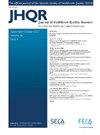Informational and educational needs of caregivers of neurologic inpatients in rehabilitation treatment: A qualitative exploratory study
IF 1
Q4 HEALTH CARE SCIENCES & SERVICES
引用次数: 0
Abstract
Introduction
The aim of the present study was to identify information and educational needs of neurological inpatients during residential rehabilitation from the caregivers’ perspective. On top of that, it was important to acknowledge the conceptual framework underlying the complexity of needs, for the development in future research of an early identification of caregiver's information needs assessment tool. This preliminary study will allow to define the dimensions on which to measure caregiver needs and the quality of care provided to the patients and their families.
Material and methods
Focus groups of family caregivers of inpatients admitted to the Neurorehabilitation Units by the ICS Maugeri Institutes were conducted to explore the caregivers needs. All focus groups were tape-recorded and contemporaneous notes made. The tapes were transcribed and thematic analysis was used to develop categories of needs. To ensure consistency between groups, a semi-structured schedule was used to guide the focus groups.
Results
In the analysis of the statements extracted from the transcripts we defined five main themes of information needs expressed from caregivers: education, hospital care organization, legal and social care management and emotional or psychological support.
Conclusion
The results provided the identification of the domains essential for the development of a questionnaire that measures the complexity of the caregiver's information needs during residential rehabilitation. The caregivers’ statements expressed in the focus groups allowed to identify five main kinds of needs. Moreover, some suggestions and ideas to improve the information and education materials to satisfy these needs emerged from caregivers and health professionals during team meetings.
接受康复治疗的神经科住院患者的护理人员对信息和教育的需求:定性探索性研究。
简介本研究旨在从护理人员的角度出发,确定神经系统住院患者在住院康复期间的信息和教育需求。此外,确认需求复杂性背后的概念框架也很重要,以便在今后的研究中开发出一种早期识别护理人员信息需求的评估工具。这项初步研究将有助于确定衡量照顾者需求和为患者及其家属提供的护理质量的维度:为了解护理人员的需求,ICS 毛杰里研究所对神经康复科住院患者的家庭护理人员进行了焦点小组讨论。所有焦点小组都进行了录音,并做了同期记录。对录音带进行了转录,并采用主题分析法对需求进行分类。为确保各小组之间的一致性,采用了半结构化时间表来指导焦点小组的工作:结果:在分析从录音誊本中提取的陈述时,我们确定了护理人员所表达的信息需求的五大主题:教育、医院护理组织、法律和社会护理管理以及情感或心理支持:结论:研究结果为编制一份调查问卷提供了重要依据,该问卷可衡量护理人员在住院康复期间对信息需求的复杂程度。根据护理人员在焦点小组中的发言,可以确定五种主要需求。此外,在小组会议期间,护理人员和保健专业人员还提出了一些建议和想法,以改进信息和教育材料,满足这些需求。
本文章由计算机程序翻译,如有差异,请以英文原文为准。
求助全文
约1分钟内获得全文
求助全文
来源期刊

Journal of Healthcare Quality Research
Medicine-Health Policy
CiteScore
1.70
自引率
8.30%
发文量
83
审稿时长
57 days
期刊介绍:
Revista de Calidad Asistencial (Quality Healthcare) (RCA) is the official Journal of the Spanish Society of Quality Healthcare (Sociedad Española de Calidad Asistencial) (SECA) and is a tool for the dissemination of knowledge and reflection for the quality management of health services in Primary Care, as well as in Hospitals. It publishes articles associated with any aspect of research in the field of public health and health administration, including health education, epidemiology, medical statistics, health information, health economics, quality management, and health policies. The Journal publishes 6 issues, exclusively in electronic format. The Journal publishes, in Spanish, Original works, Special and Review Articles, as well as other sections. Articles are subjected to a rigorous, double blind, review process (peer review)
 求助内容:
求助内容: 应助结果提醒方式:
应助结果提醒方式:


